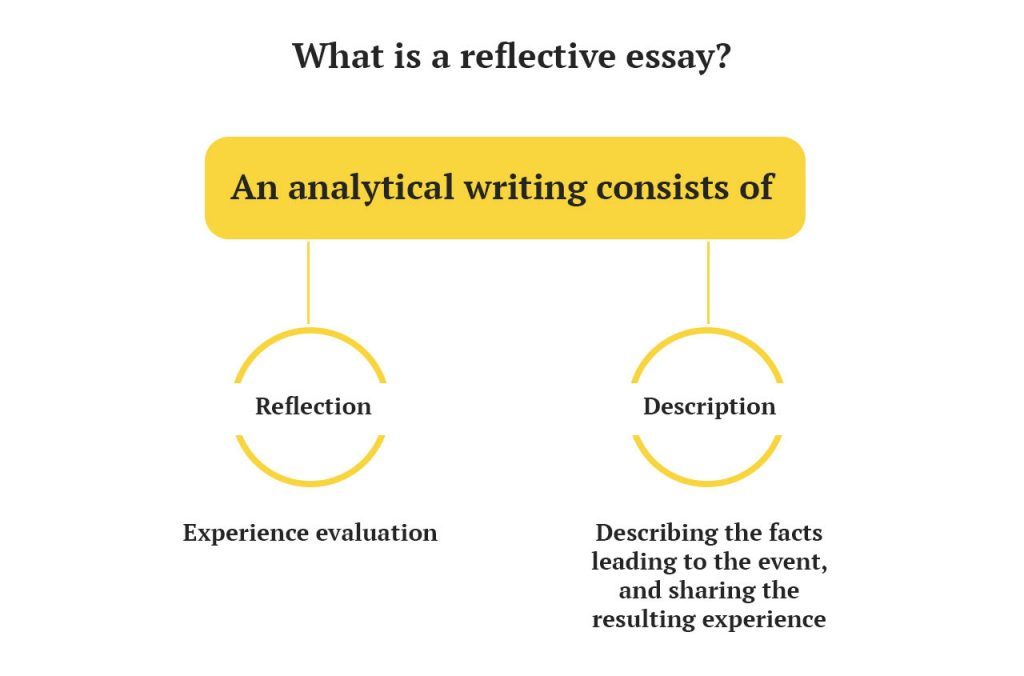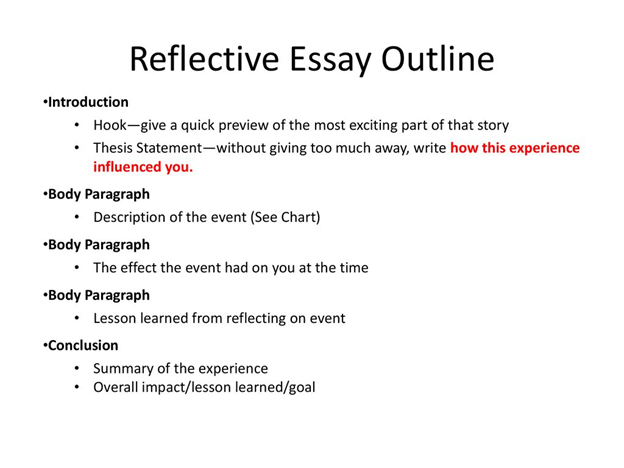1. Introduction to Reflection Essays
1.1. What is a Reflection Essay?
A reflection essay is a type of academic writing that invites you to articulate your viewpoint regarding a particular subject. Within this essay, you will assess and contemplate the influence of a book, personal experience, or academic lecture on your perspectives and ideas. Learn how to write a reflection essay, a powerful form of academic writing that empowers you to share your unique perspective.
This essay form allows you the freedom to express personal opinions, with the unique aspect that there are no clear right or wrong answers in academia.
Types of Reflection Essay
When it comes to crafting a reflection essay, there are two main categories to consider. The first type, known as experiential reflection, involves an examination of a personal experience or observation. In this context, your task is to summarize and emphasize the fundamental principles that bolster your analysis of the experience.
The second category, textual reflection, centers on the analysis of a written document, be it an article, essay, or book. In the realm of writing a reflection essay, your perspective, analysis, and interpretation of the material are substantiated with specific quotations.

A reflection essay is a type of academic writing that reflect your viewpoints
1.2. Why Reflection Essays Matter
In the academic landscape, reflection assignments offer a distinctive opportunity to depart from the conventional structure of essays. Unlike other types of essays that often necessitate a strictly objective or analytical approach, reflection essays encourage you to share your subjective viewpoints, experiences, and emotions.
If you ever find yourself navigating the intricacies of reflection assignments, it's essential to recognize that assistance is readily available. Services like MAAS Writing Service are here to provide support and guidance on your journey of mastering reflection essays.
Read more: How to write sociology essays that wow professors: Tips from expert
2. Understanding Reflection Essays
2.1. The difference between reflection and other types of essays
When delving into the world of how to write reflection essays in an effective way, it's essential to comprehend the distinctive qualities that make reflection essays stand out:
- Unique Academic Genre: Reflection essays represent a unique genre of academic writing that deviates from the standard conventions. They provide a platform for personal expression and exploration.
- Subjective Perspective: Unlike many other types of essays that demand objectivity and analysis, reflection essays embrace subjectivity. They encourage you to share your personal viewpoints, emotions, and experiences.
- Absence of Strict Rules: One of the most defining characteristics of reflection essays is the lack of strict rules and predefined answers. Contrary to structured academic essays, reflection essays provide the liberty to shape your narrative.
- Encouragement of Creativity: This liberating aspect encourages creativity. You have the opportunity to delve into your thoughts and feelings, fostering a unique connection with the subject matter.
- No Right or Wrong: In the realm of reflection essays, there are no definitively right or wrong responses. Your essay represents your individual perspective, and there is no universal yardstick for evaluation.
- Fostering Critical Thinking: Reflection essays promote critical thinking. They challenge you to analyze your experiences, emotions, and beliefs, contributing to your personal and intellectual growth.
- Tool for Self-Discovery: These essays serve as a powerful tool for self-discovery. By reflecting on your experiences and sharing your insights, you gain a deeper understanding of yourself.
2.2. The self-analysis and personal growth aspects
Reflection essays revolve around the act of self-analysis, which sets them apart from other forms of academic writing. Here's a breakdown of what self-analysis entails:
- Personal Reflection: These essays require a deep dive into your thoughts and experiences. You are encouraged to reflect on your personal journey, opinions, and emotions.
- Challenging Your Beliefs: Self-analysis in reflection essays challenges your existing beliefs and perspectives. It compels you to question and explore the reasoning behind your thoughts and actions.
- Growth and Learning: Self-analysis is a powerful tool for personal growth and learning. It enables you to identify areas for improvement and gain insights into your own development.
- Empathy and Understanding: Through self-analysis, you can develop empathy and a better understanding of yourself and others. It promotes a more profound connection with the subject matter.
- Articulating Insights: Self-analysis is about not only identifying your insights but also articulating them effectively. It's the process of translating your thoughts and feelings into a coherent narrative.
3. Choosing a Topic for Your Reflection Essay
3.1 How to select a suitable topic.
Selecting an intriguing topic holds paramount importance, benefiting both the writer and the reader. When you have a genuine interest in the subject matter, the process of crafting your reflection assignment becomes a more enjoyable endeavor. Simultaneously, an engaging topic captivates the reader's attention, enhancing the overall appeal of your paper.
For instance, consider the theme of a reflection paper, such as how one's perspective on pop music evolves over time. This personal topic is captivating for both writers and readers. Essay services can refine and enhance your writing experience.
3.2. Personal experiences, events, or challenges
In the realm of selecting your reflection essay topic, the wellspring of inspiration often lies in your personal experiences. This section sheds light on:
- Life Experiences: Your personal journey, life events, and encounters can serve as a wellspring of inspiration. Reflect on experiences that have left a mark on you.
- Emotional Impact: Consider experiences that have evoked strong emotions, be it joy, sadness, growth, or transformation. These emotions can fuel a reflective exploration.
- Challenges and Triumphs: Reflect on challenges you've faced and the lessons learned. Conversely, you can delve into moments of triumph and the insights they've offered.
- Growth and Change: Personal growth and transformations often provide rich material for reflection essays. Explore how you've evolved over time.
For guidance and support drawing from personal experiences, remember MAAS Writing Essay Service is here for you. Our expertise can assist you in navigating this pivotal aspect of crafting your reflection essay.
3.3. The significance of the chosen topic.
In the realm of reflection essays, it's customary to adhere to a specific word range, typically spanning between 250 to 800 words. This concise format has a purpose: to prioritize the inclusion of only the most pertinent and crucial information. The key lies in keeping your reflection focused, allowing for the efficient delivery of your ideas within the designated word count.
To maximize the impact of your essay, it's crucial to avoid veering off into tangents or indulging in extensive summaries. This ensures that your points are conveyed effectively and concisely. By adhering to this word limit, you cultivate the art of precision in your writing.
4. Structuring Your Reflection Essay
4.1. Typical structure of a reflection essay.
A reflection essay is a well-orchestrated composition with a structured rhythm.
- Introduction: The essay's overture, introducing purpose and topic, much like setting the stage for a performance. The thesis, a central melody, supported by insights into your choice. Think of it as a prelude to engage the audience.
- Body Paragraphs: The main movement, where each paragraph plays a musical note, presenting an in-depth analysis. If it's a reflection on an experience, treat each paragraph like a verse, starting with a topic sentence as the key. Dive into quotes, references, and examples— the heart of your composition.
- Conclusion: The grand finale, summarizing the orchestrated ideas and opinions. Reflect on what you've learned, like a melody reaching its resolution. No encore here; the conclusion is a graceful closure, restating your original thesis.

The structure of an essay include 3 parts
4.2. The importance of clear organization.
- Organizational Importance: The arrangement of your thoughts is not just a cosmetic aspect; it's the backbone of your essay. A well-organized piece ensures that each idea flows seamlessly into the next, preventing confusion and enhancing readability.
- Logical Flow: Think of your reflection essay as a narrative unfolding. The logical progression of ideas and experiences is akin to a well-crafted story, capturing and maintaining the reader's interest. A clear flow guides the reader through your reflections effortlessly.
- Enhancing Reader Understanding: Your insights are valuable, but their impact multiplies when presented cohesively. Clear organization aids in reader comprehension, allowing them to grasp the significance of each reflection and its contribution to the overall narrative.
- Capturing Attention: In a sea of information, a well-organized reflection essay stands out. It captivates the reader's attention from the introduction through the conclusion, making the journey enjoyable and memorable.
5. Incorporating Personal Insights
5.1. How to include your thoughts and feelings
Your reflection essay is not a robot reciting facts; it's a canvas for your emotions and ideas. Be unabashedly you. Use vivid language to convey how you felt during experiences or while exploring a particular topic. Whether it's joy, confusion, or revelation, paint the emotional landscape for your reader. This is your space to be genuine, so don't hold back.
5.2. The process of self-analysis
Self-analysis is the compass guiding your reflection. It's not just about what happened but about understanding why it matters to you. Ask yourself probing questions. Why did a certain experience leave an impression? How has it shaped your perspective? Dig beneath the surface, uncovering layers of meaning.
This process not only adds substance to your essay but also demonstrates a thoughtful engagement with your own thoughts.
5.3. Depth and authenticity
Depth is the magic word here. Don't skim the surface; dive deep. When exploring a theme or experience, go beyond the obvious. Unpack the layers, dissecting the nuances. This depth comes from your personal insights—how you interpret and connect with the subject matter. Authenticity is your ally. Share your genuine reactions and realizations
6. Writing an Effective Conclusion
The conclusion serves as a concise summary of the concepts and arguments expounded in your paper. Within this section, you have the opportunity to articulate the insights gleaned from your examination of the article or experience. Additionally, it provides a platform to restate and underscore the significance of your initial thesis statement.
Example: In conclusion, this essay delves into the repercussions of human-induced climate change, honing in on the escalating sea levels and their far-reaching effects. The insights gained from this analysis illuminate the urgency of addressing our environmental footprint and underscore the enduring importance of taking decisive action to mitigate the consequences outlined in the initial thesis.
7. Editing and Proofreading
Before submitting your paper, it's crucial to meticulously proofread it multiple times. Take the time to rectify any grammatical or factual inaccuracies. Seeking feedback from colleagues, classmates, and mentors, alongside the support of MAAS Writing Service, can be invaluable in refining your work and gaining diverse perspectives. Additionally, if there are specific guidelines provided for the paper, thoroughly review them to guarantee adherence to all instructions.

Thoroughly proofreading your paper multiple times is essential before submission
8. MAAS Assignment Writing Service Help
8.1. Introducing MAAS Education Technology
MAAS Education Technology, a Vietnam-based education institution, specializes in Academic Writing. With experienced professors guiding the way, we provide global academic assistance in Essays, Assignments, Dissertations, and Online Exams. Our mission is to support students worldwide, addressing challenges like tight deadlines and writer's block. We're committed to helping you excel in your academic journey, including top-notch dissertation services.
Explore: How to write a great Consultancy Report
8.2. How MAAS Benefits Students Globally
At MAAS, we take pride in distinctive features:
- Skilled Writers: Our team comprises knowledgeable professionals offering valuable insights to enhance your academic performance.
- Advanced Plagiarism Check: Our impressive AI tool collaborates with Turnitin, detecting plagiarism or AI-generated content, ensuring originality and high quality, setting us apart in the academic world.
8.3. Range of Services Supported by MAAS for International Students
MAAS Writing Service, equipped with a team of essay writers, offers diverse services, including Research, Dissertation, Assignment Support, Online Exam and Essay Writing. With over 8 years of experience, MAAS is globally recognized for providing writing services to international students. Our services aim to:
- Save You Time: Managing tight deadlines becomes seamless with our assistance, ensuring timely assignment submissions.
- Enhance Your Writing: Our expert writers guide you toward becoming a more proficient writer.
- Improve Your Grades: Expect better grades and enhanced academic performance with our dedicated support.
- Help You Balance: We assist in finding the right equilibrium between studies and life responsibilities, alleviating stress and fatigue.
9. Reference
Writing a Reflective Essay: A Complete Guide. (2022, December 1). Oxbridge Essays. Retrieved October 21, 2023, from https://www.oxbridgeessays.com/blog/complete-guide-to-writing-a-reflective-essay/
Royal Holloway International Study Centre. (2023). How to write a reflection paper. Retrieved October 21, 2023, from https://www.rhulisc.com/blog/how-to-write-a-reflection-paper
Indeed Canada. (n.d.). How to Write a Reflection Paper. Indeed Canada Career Advice & Development Center. Retrieved October 21, 2023, from https://ca.indeed.com/career-advice/career-development/how-to-write-a-reflection-paper
Trent University Academic Skills Centre. (2023, October 26). How to Write a Reflection Paper. Retrieved October 21, 2023, from https://welcome-magicred.com/how-to-write-a-research-reflection-paper
Read more:
